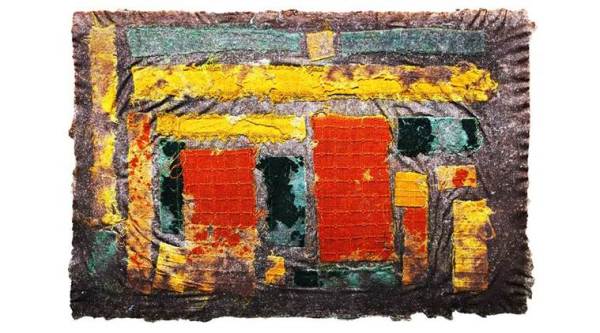Borders that unite
Eight artists from India and Pakistan address notions of redressal through an exhibition in New York

Priya Ravish Mehra’s untitled work, which are part of the display at New York’s Aicon Gallery
Some time last year, the late textile artist and weaver Priya Ravish Mehra sent a shawl woven in pre-Partition Sindh to Karachi-based textile artist Shehnaz Ismail. In return, Ismail sent her a pink silk chador. Over the next few months, the two worked with each others’ garment. While Mehra did rafoogari on the silk fabric, Ismail too did the same and screen printed Mehra’s shawl with a verse from Punjabi writer and poet Amrita Pritam’s book, Main Tenu Pher Milangi. “This was just a way of sending, mending and healing something that came to them in a sad state. They only exchanged one email, but somehow there was a great empathy (between them), that I found very moving,” says curator Salima Hashmi.
The above work is one of the several by Mehra that comprise the exhibition “Pale Sentinels: Metaphors for Dialogues”. Coming more than two months after Mehra lost her life to cancer, the exhibition marks her New York debut. It also, significantly, marks 70 years of independent India and Pakistan. “I looked at artists who, one way or the other, look at borders, constraints and conflicts,” says Hashmi. The showcase, she recalls, is an outcome of a conversation between her and Prajit Dutta, owner of New York-based Aicon Gallery, last year at Art Dubai. The two noticed the absence of joint exhibitions to celebrate the anniversary. “For the last two years or so, even cultural communication between the two countries has become exceedingly difficult. We felt the logistics would be easier if we did something outside the two countries,” recalls Hashmi. The exhibition is on at Aicon Gallery till July 28.
Each of the eight artists — Faiza Butt, Waqas Khan, Ghulam Mohammad, Saba Qizilbash, Shilpa Gupta and Nilima Sheikh, besides Ismail and Mehra, “reflect upon the faded accounts, mementos and narratives of loss that came about as a result of the complete demographic transformation during the 1947 Partition”. The title is based on the poem A Prison Morning by celebrated poet Faiz Ahmed Faiz (Hashmi’s father), where he describes daybreak in a jail cell through a prison guard.
If in his monochromatic drawings, Khan forms patterns with delicate strokes on archival paper, while Mohammad’s triptych Yaad Dasht has unidentified family photographs as a backdrop for laser-cut Urdu text. The 2016 Jameel Prize winner dwells on language and the deep voids left by the Partition. London-based Butt comments on conflict, separation and enforcement, making references to consumables and sharing her observations on how media projects people, often promoting stereotypes. “It is left to the people to unravel and make connections,” notes Hashmi.
If Sheikh’s Departure has a man on the threshold, with a bird in the sky ready to take flight, Mumbai-based Gupta asserts that the land can be divided but not the sky, in her digital print, titled Border Sky. “The sky evades the border,” says Hashmi.
For all the latest Lifestyle News, download Indian Express App






















 Shehnaz Ismail’s What have they done to my land
Shehnaz Ismail’s What have they done to my land
No hay comentarios:
Publicar un comentario